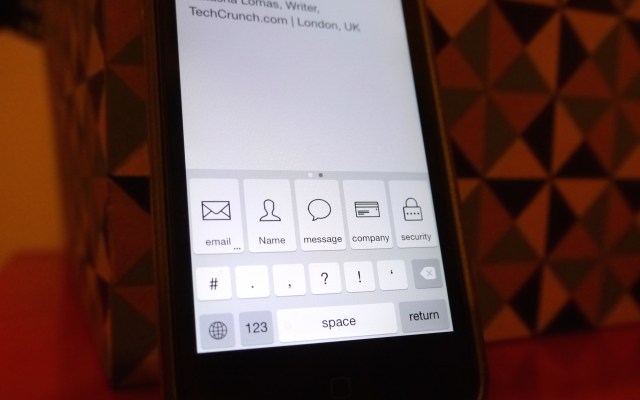Tired of retyping stuff like your name, email and physical address when using iOS devices? A new keyboard app for iOS, called OftenType, has a quick fix for this type of personal data-related typing fatigue: it’s added custom shortcut keys to the standard iOS keyboard to save you some of the taps.
Some of the taps, not all of the taps. You do still have to toggle between OftenKey’s custom keys views and the standard iOS Qwerty keyboard — by taping on the globe key — when you do actually want to spell things out. So it’s not an entirely friction-free process. (Nor is it free: OftenType currently costs $0.99.) Also worth noting that iOS 8 allows you to create custom shortcuts yourself, such as typing ‘omw’ for “on my way!”, which is free and does not require an additional keyboard to be added, but does require you to memorize all your shortcuts.
With OftenType you can also store whole messages, under a ‘Message’ key, so if you’re a formulaic texter you might be able to chain together a fair few snippets before needing to resort to any freestyle Qwerty. Basic punctuation and the spare bar remain within reach on the custom key screen to help you glue multiple shortcuts together.
OftenType is pretty similar to the (free) Phraseboard app, which launched last year. Although it leaves the contents of your custom keys concealed behind icons with generic (but also customizable) names — such as ‘Email’, ‘Name’ and ‘Message’ — rather than sticking it right on the Qwerty. So a casual shoulder surfer is not going to be able to read your personal data. Well, unless you make the name of the icon the same as whatever info you want it to summon up.
The mechanism for creating the custom keys is also slightly different, with OftenType providing templates under each key category to input personal data — which will probably appeal to those with multiple bits of info to manage, such as more than one email address or several phone numbers.
A custom OftenType key with extensions (i.e. multiple bits of info stored within it) is shown with an ellipsis at the end of its name. Tapping on the key brings up all the stored options. Up to four snippets of info can be stored per key. But you can apparently create an unlimited quantity of custom keys.
One thing to note: while there is a key type called ‘Security’ — which seems to invite people to store oft typed passwords there — the app’s Privacy Policy points out that’s a bad idea. “Though we do not collect you[r] information, we do not recommend to store secure information such as passwords or card numbers in full inside quick keys. Please, mind that they can be used in case of device loss or theft,” it notes.
As with all keyboard apps it’s worth considering privacy and security carefully — because of the vast troves of data you could theoretically be handing over. And also, in this case, where you’re storing pieces of personal data within the app. OftenType says it does not store this data on its own servers, but rather it’s kept locally on your device.
The keyboard does require the iOS 8 user to grant it Full Access in order to function, though. OftenType says it needs this to enable the connection between the data stored locally in its app wrapper and the iOS 8 keyboard. “Without Full Access even connection between the app and the extension within the device is prohibited by Apple,” notes OftenType’s Artem Pochepetskyi.
The only data Pochepetskyi says the team does look at — for the purpose of improving the app itself — are factors such as the icons and titles users use/create, how often they use the shortcuts, how many quick keys are created. “And we take it in an anonymous format,” he adds. “OftenType went through the whole Apple review process, where they check all the data storage and uploads by developers.”
For more on iOS 8 keyboard permissions read TC’s explainer here.
